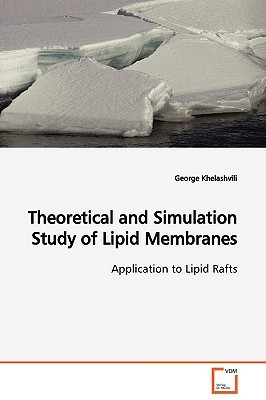
- We will send in 10–14 business days.
- Author: George Khelashvili
- Publisher: VDM Verlag
- ISBN-10: 3639001400
- ISBN-13: 9783639001402
- Format: 15.2 x 22.9 x 0.8 cm, minkšti viršeliai
- Language: English
- SAVE -10% with code: EXTRA
Theoretical and Simulation Study of Lipid Membranes Application to Lipid Rafts (e-book) (used book) | bookbook.eu
Reviews
Description
Proper functioning of biological membranes is in large part due to cholesterol's ability to regulate fluidity of a lipid bilayer. The evidence suggests that cholesterol participates in the formation of cholesterol- and sphingolipid-enriched domains known as "rafts" in the plasma and other membranes of animal cells. Rafts have been identified as an important membrane structural units in signal transduction, protein transport and sorting of membrane components. The goal of this research is to model raft-like membrane domains with tools of computational biophysics. In the first part of the work, mixtures of sphingomyelin lipid and cholesterol are investigated using molecular dynamics and Monte-Carlo simulations. In the second part of the book, a novel dynamic mean-field model is developed to investigate phase properties of lipid-cholesterol membranes. This new technique allows studying large bilayer patches on microsecond timescales, and has powerful predictive capability. The material in this book is most suitable for computational biophysicists and biologists, as well as for scientists working in statistical and condensed matter physics fields.
EXTRA 10 % discount with code: EXTRA
The promotion ends in 24d.00:37:30
The discount code is valid when purchasing from 10 €. Discounts do not stack.
- Author: George Khelashvili
- Publisher: VDM Verlag
- ISBN-10: 3639001400
- ISBN-13: 9783639001402
- Format: 15.2 x 22.9 x 0.8 cm, minkšti viršeliai
- Language: English English
Proper functioning of biological membranes is in large part due to cholesterol's ability to regulate fluidity of a lipid bilayer. The evidence suggests that cholesterol participates in the formation of cholesterol- and sphingolipid-enriched domains known as "rafts" in the plasma and other membranes of animal cells. Rafts have been identified as an important membrane structural units in signal transduction, protein transport and sorting of membrane components. The goal of this research is to model raft-like membrane domains with tools of computational biophysics. In the first part of the work, mixtures of sphingomyelin lipid and cholesterol are investigated using molecular dynamics and Monte-Carlo simulations. In the second part of the book, a novel dynamic mean-field model is developed to investigate phase properties of lipid-cholesterol membranes. This new technique allows studying large bilayer patches on microsecond timescales, and has powerful predictive capability. The material in this book is most suitable for computational biophysicists and biologists, as well as for scientists working in statistical and condensed matter physics fields.


Reviews